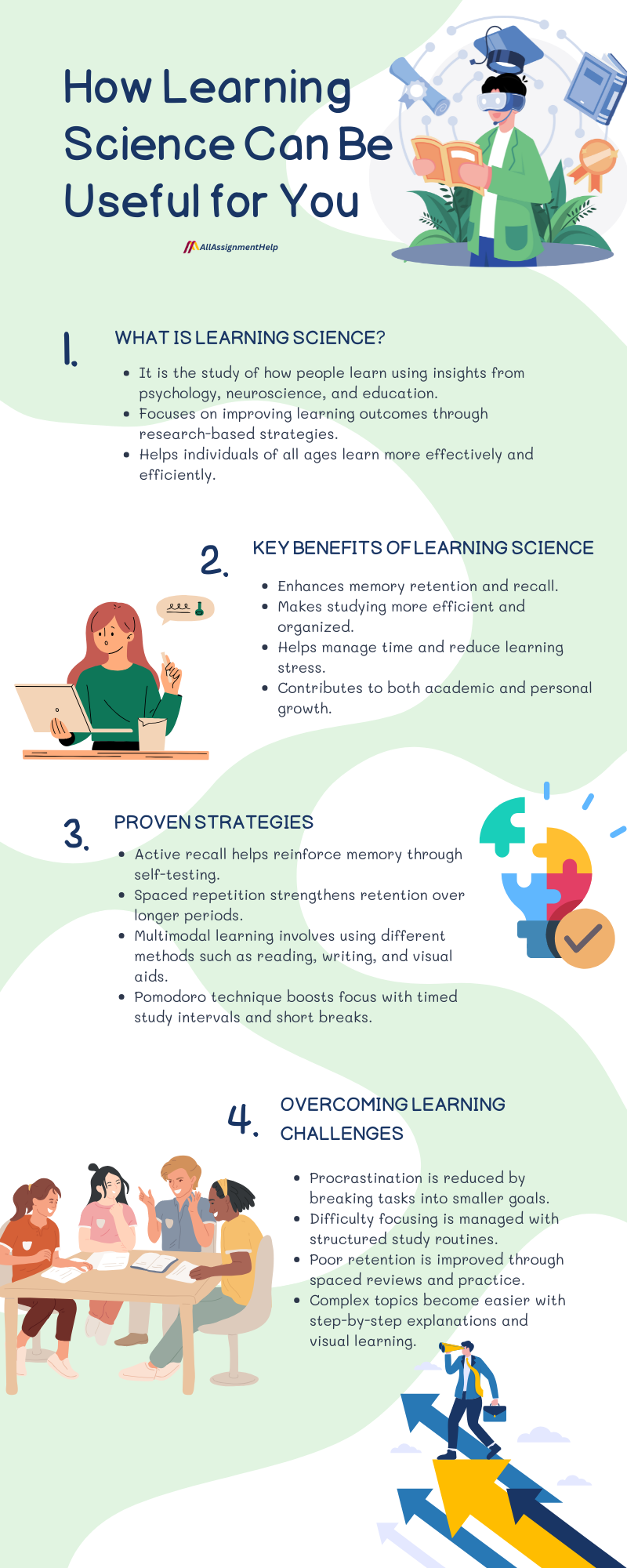Table of Contents
Today, the skill of learning has turned into a high-demand skill. Moreover, for those struggling to become learners, learning science can transform your journey. It is a discipline that focuses on how people absorb, retain, and apply knowledge. Furthermore, it draws on psychology, cognitive science, and neuroscience to develop models and strategies for promoting deep and meaningful learning in almost any teaching situation. From improving memory retention to forming better study habits, learning science can be used in almost any facet of life.
This blog by All Assignment Help discusses how learning science can help you improve your personal and professional development, overcome challenges, and make your learning process easier.
What is Learning Science?
Learning science is an interdisciplinary academic field that investigates how people learn and how to improve the process by which people learn. It is based on insights from cognitive psychology, neuroscience, education, and technology. Learning science fundamentally aims to identify the most effective ways to improve learning across different settings.
- Cognitive psychology focuses on the brain and the way it processes, stores, and retrieves information.
- Neuroscience helps in understanding how brain functioning and neural pathway structure affect the learning process.
- Theories of education bridge the gap between the reasons for learning and ways to apply learning in practice.
- Educational technology is the medium that helps with teaching and learning through tools and resources.
Moreover, learning science can help students and tutors in finding better study strategies when using academic services. It highlights the necessity of self-testing, spaced repetition, and retrieval practice, among other methods. Using the principles of learning science, online assignment help services provide personalised approaches, such as segmenting study plans or using interactive tools that help learners learn better.
At its core, learning science is figuring out the hows and whys behind the learning process and harnessing that knowledge to optimise our way of learning. If you are doing difficult or specialised coursework, the lessons of learning science can make your work much more targeted, efficient, and fruitful.
Also read: Everything You Should Know Before Studying Neuroscience

How Learning Science Improves Learning Efficiency
There have been scientific studies that explain how to learn efficiently and for a longer period. Using the below-mentioned science of studying, students have the potential to improve their study techniques dramatically and make retrieving information more efficient and purposeful.
Key strategies for boosting learning efficiency
- Active recall and spaced repetition are some of the most powerful learning strategies you can use in science. Active recall is when you test yourself on the material instead of reviewing your notes passively.
- Moreover, retrieval practice is one of the best techniques to create lasting memories and facilitate long-term learning. In contrast, spaced repetition means studying material first at shorter intervals, and then it will be reinforced with increasingly longer periods in between.
When students ask for online class help, these strategies prove to be very useful. Online tutors and platforms that help frequently use evidence-based learning science techniques to help students navigate difficult material. When it comes to studying, these services make sure that students learn key concepts and retain them much better by mastering techniques like spaced repetition and active recall and incorporating them into the study schedule.
Moreover, learning science teaches that learning should be multimodal. It means we should interact with the material we want to learn using as many channels as possible, like reading, writing, listening, practising, etc. It utilises different pathways in the brain, providing a greater learning experience and learning impact.
Also read: A Guide to Basic Data Science Interview Questions
Real-World Applications
Learning science is not just an abstract subject; it yields practical benefits to educational systems and helps individuals grow. Moreover, its principles are applied to learning and training in every sector, including classrooms and workplaces.
For example, in education, modern learning science has changed how one teaches a lesson. With evidence-based moves such as spaced learning, active engagement, or feedback loops, educators are enabling rooms that encourage deeper understanding and prolonged memory. These techniques also help students who are preparing for exams. However, high-stakes exams can make students turn to academic help services with requests like, can someone take my online exam for me? These services help students learn and apply techniques to ensure that every minute they spend studying is effective and efficient.
Professionally, learning science helps in improving the learning and development (L&D) in organisations. These principles are used primarily by organisations to lay the groundwork for their training modules so that employees are engaged and the retention of skills is enhanced, leading to improved work productivity. When courses or certifications are offered through online platforms, learning becomes more individualised, accommodating a learner’s pace when learning science is applied in practice.
The field of learning science has a diverse range of applications, from education to corporate training. It assists learners of all levels in learning more efficiently. Everyone remembers more and performs better in academic and professional environments.
The Role of Learning Science in Personal Growth
The learning science is also necessary for personal growth. When individuals understand how we can learn, they can use learning science to build skills, enable hobbies, and increase their capabilities. Moreover, it helps motivate personal learning. By making use of spaced repetition or active recall, you can speed up your learning process when working on new skills, whether it is a musical instrument, a language, or a creative hobby outside of school. They improve learning efficiency and motivate the visibility of progress gained and mastery achieved.
Furthermore, learning science can guide us in the development of habits necessary for personal growth. Methods like goal setting, self-reflection, and mindfulness, frequently influenced by cognitive science, have been shown to improve attention and drive.
Students looking for specific subject assistance, for example, biology assignment help, can use learning science techniques to excel in complex topics. It is important when studying difficult topics, especially in hard sciences like biology, to use proven techniques to break down and remember challenging concepts. This use of learning science enhances the academic performance of students but also helps in personalising their development by assisting them in becoming more confident and critical thinkers before facing the outside world.
Overcoming Common Learning Challenges
There can be several reasons that can challenge your learning, such as distraction, demotivation, or maybe you find the topic tough. Fortunately, learning science provides solutions to these challenges that make learning easier and more efficient.
Common learning challenges and how learning science can help meet these challenges.
- Procrastination: Setting small, specific goals. When students have smaller, manageable tasks ahead of them, they are less likely to be overwhelmed and more likely to begin working. In addition, by having study sessions, it also creates a routine.
- Lack of focus: Studying for hours together can make even the most interesting topic boring and demotivating. Hence, a technique like the Pomodoro method allows you to stand up, walk around and refresh your mind.
- Poor retention: Spaced repetition is the best way to fight memory decay. This approach helps reinforce memory so the material stays in our minds for the long haul.
- Understanding complex subjects: If you are trying to master subjects like physics, physics assignment help can be used to apply science strategies like visualising information or breaking complex concepts down into more manageable steps. Such methods are effective in helping one understand complex subjects.
- Excess workload: Those pursuing challenging courses, such as nursing, can avail themselves of nursing assignment help to implement learning science strategies to formulate structured study. This allows students to pace their gaming sessions right and simultaneously perfect their grasp of certain concepts.
With these principles in mind, students should be able to surmount some of the more typical learning struggles more smoothly. It results in better test scores and an improved learning experience overall.
Conclusion
Learning science provides us with powerful, actionable strategies to improve the way we learn, remember, or transfer skills and knowledge. Using techniques like active recall, spaced repetition and multimodal learning, these methods can help improve learning efficiency. It also helps in combating issues such as procrastination and distraction. From learning something challenging to developing a new skill, learning science makes learning more productive and pleasurable. Using these techniques, both students and working professionals can bring out the best in themselves and then grow in their personal as well as academic pathways.
Frequently Asked Questions
Question: What is learning science?
Answer: Learning sciences are the study of how people learn, drawing on psychology, neuroscience, and education, making it an interdisciplinary field.
Question: In what ways can learning science help me study better?
Answer: Learning science gives us techniques such as active recall and spaced repetition, which improve long-term retention of memories and make studying less time-consuming.
Question: Can learning science help me with complex subjects?
Answer: Yes, you can take complicated subjects and use learning science concepts like chunking and visuals to make them easier to digest.
Question: How can learning science help me handle my workload?
Answer: With things like goal setting and spaced learning, so a person is not overwhelmed, learning science helps with cognitive load.
